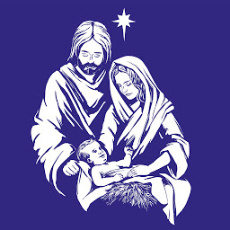Scripture
Matthew 1:18-21, 24-25 NRSV
Now the birth of Jesus the Messiah took place in this way. When his mother Mary had been engaged to Joseph, but before they lived together, she was found to be with child from the Holy Spirit. Her husband Joseph, being a righteous man and unwilling to expose her to public disgrace, planned to dismiss her quietly. But just when he had resolved to do this, an angel of the Lord appeared to him in a dream and said, “Joseph, son of David, do not be afraid to take Mary as your wife, for the child conceived in her is from the Holy Spirit. She will bear a son, and you are to name him Jesus, for he will save his people from their sins.”…When Joseph awoke from sleep, he did as the angel of the Lord commanded him; he took her as his wife, but had no marital relations with her until she had borne a son; and he named him Jesus.
Consider
As deliberately as God chose Mary, God chose Joseph to be a parent to Jesus.
We know little of Joseph apart from this introductory passage. Yet in these few sentences, we see the character of the man who would become the primary moral teacher for God’s Son as he was growing up.
Matthew’s Gospel describes Joseph as “a righteous man.” For a Jew, this meant a man who lived in obedience to God’s law. Following the Jewish customs of his day, Joseph betrothed himself to Mary, which meant binding himself to her—and her to him—in a legal contract that required sexual fidelity and promised marriage, usually within a year, when they would consummate their union and finally live together as a couple.
Mary was about four months pregnant when Joseph first learned of her condition. The natural assumption was that she had been sexually unfaithful, which legally made her guilty of adultery. Her perceived betrayal made any union with her impure, and as a righteous Jew, Joseph was obligated to divorce her. His dilemma, however, was how to balance right behavior with compassion for Mary. If he took her to court, he could exonerate himself at her expense, plus he could keep the dowry Mary would bring to the marriage. He could escape public censure, but Mary would be ruined.
Joseph decided on a plan that was both just and gentle. He would divorce her, as he must, but quietly, that is, privately, with only two or three witnesses, and forfeit the dowry. He would honor both God and Mary by obeying the law but in the kindest way possible. Note that he settled upon this plan while he still believed she had betrayed him. He had not yet heard from God’s angel, confirming that Mary’s pregnancy was innocent and holy. Joseph demonstrated godly character and a deep understanding of God and the law that escaped many of the religious leaders of his day. As he would later teach Jesus, righteous living must include compassion and mercy as well as obedience, or the law loses its divine heart and purpose.
The passage concludes with Joseph’s immediate compliance with God’s new plan for his future. He accepted the inevitable finger-pointing and disgust from neighbors (and family) who would blame him for Mary’s disgrace, and he took Mary to be his wife. And when her son was born, Joseph named him, which is what Jewish fathers did to declare to the community that he accepted this child to be truly and legitimately his.
Pray
Almighty God, thank you for the example of truly righteous living You give us in Joseph. Thank you for this glimpse into the character of the man who raised and trained your Son in correct understanding of your holy Word. When I face disappointments and betrayals in my life, help me to balance my response with both justice and compassion. Keep my first loyalty to your ways and your good purpose as you direct me in my relationships.
Reflect
Micah 6:6-8; Matthew 9:10-13; 22:34-40
Ponder
What qualities in Joseph made him a good father to Jesus and husband to Mary?







